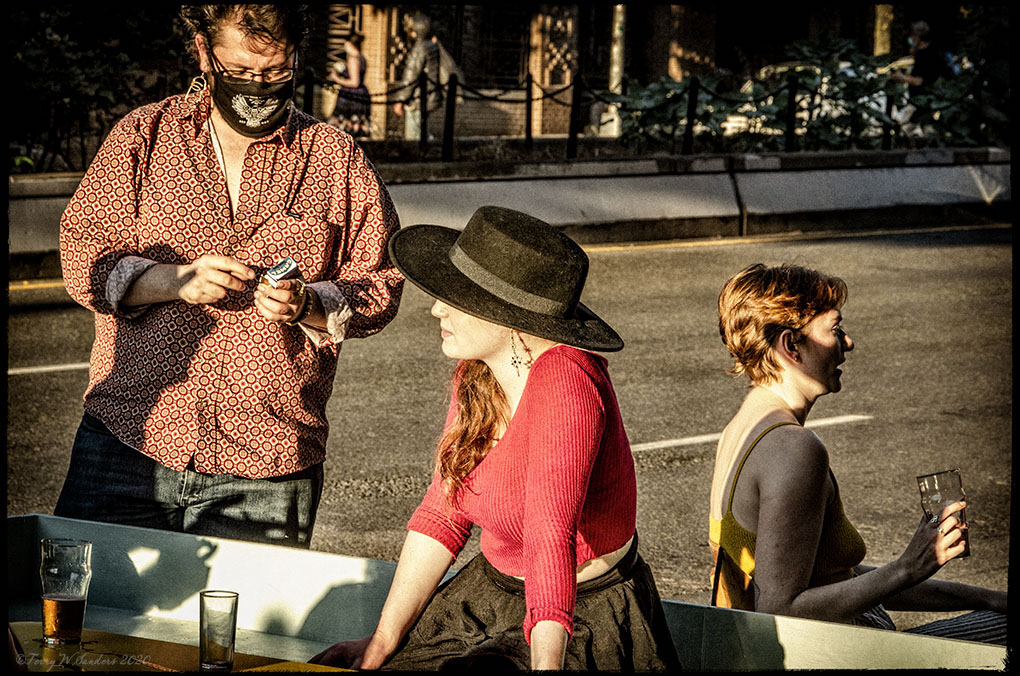The COVID-19 situation in New York City remains stable: indeed, it is even improving. As Mayor Bill de Blasio confirmed on Twitter yesterday, the “red” zone in Brooklyn and Queens have leveled off to orange areas, some even to yellow, a major improvement that allows schools and non-essential businesses to reopen. Thanks to the preventive measures taken by Mayor and Governor Cuomo, NYC seems to be breathing more easily, while the rest of the US is struggling to contain the surge of coronavirus infections.
Aside from the importance of keeping the amount of infections under control, however, there is another important unknown factor for those who are now in New York: how is life in the big apple, which everyone describes as deserted, and suffering, due to pandemic? I talked to some of my acquaintances, focusing on the younger population, which faces problems that are different from any other age group. Most young people, of course, can breathe easier, being at less risk of having serious repercussions from COVID-19. But it is also true that young people often live far from their families, are just now looking for a job, have less opportunities to rent large houses in which to better deal with smart working, etc.
In short, the difficulties for young people are many. Most feel lonely, trapped in small but very expensive apartments, while frantically trying to find work in an economy that does everything but favor new workers. “The biggest challenge for me is being forced to stay indoors,” says Isabelle, a 22-year-old NYU graduate, originally from San Francisco, who lives in the West Village. “I’ve lived alone for three years now, but in the past it has never been a cause of stress or loneliness. I was always either on campus, or in any case amongst other people, and always had some company.”

In the past, indeed, for Isabelle, living alone was a blessing: after busy days, always out and about, always with friends or on campus, returning to her home and enjoying time for herself used to cheer her up. “Now, however, I spend all day in my small apartment. I’m looking for a job, so I sit at my table, from 9 to 5, and send out job applications everywhere. After that I might take a walk, but then even then, after I’m back to being locked indoors. Days go by without me being able to see anyone.” Isabelle, in order to try to manage the difficulties imposed on her mental and emotional well-being, decided to start seeing a therapist, who is helping her to get used to her new situation.
“For now, I’ve been holding on to the idea of staying in New York,” says Isabelle. “Mainly because I don’t want to go home to California, where I’m supposed to live with my parents, and work for my dad. But, at the same time, I no longer know if it is worth it to pay an exorbitant rent to just be locked in a studio apartment. In the next few months I will decide whether to stay or go. ” Isabelle’s situation is common to many of my acquaintances, who have all studied in New York, all young people who love this city madly, who still remember how much freedom it gave them in their golden years. But, for now, at least, it seems that magic and freedom have disappeared.

Having a stable, well-paid job certainly helps, and is one of the first factors that, once resolved, helps young people to breathe a sigh of relief. But it carries its own difficulties. Maria, 23, a resident of the East Village, for example, got a job as a consulting analyst at Morgan Stanley. “Obtaining such a coveted and, above all, well-paid job in such dark times was my lifeline,” explains Maria, who graduated from New York University’s Stern School of Business. “The problem for me, though, is the fact that I have no way to form new friendships. Most of my friends have left: some are at home with their families, waiting for the situation in the city to improve before coming back, others have moved away to pay less rent. “
What prevents Mary from making new friends, and not feeling alone? Smart working. As she explained to me, about 90 new analysts are hired every year, and the office, for the first few weeks, turns into a large arena where young people interact, get to know each other, go out after work to have a drink. In short, where interpersonal relationships are favored. “But now, working remotely, I have not been able to meet anyone,” explains Maria. “It is a very difficult situation: my friends from my university years are almost all away, and I cannot meet new ones. So I spend all day in my room, working, after dinner I watch some TV, and on the weekend I try to see those few friends still in town.”
Maria, however, has not lost all hope, and believes in a renaissance for New York City. “I decided to stay in the city, partly because I’m lucky, and I can afford the rent, but mostly because I don’t think New York will ever die,” says Maria. “It is one of the most energetic and vibrant cities in the world, and I want to be here when it is finally reborn.”

For many others, like my dear friend Andrew, 23, who used to work for a large company and lives in Brooklyn, taking care of their mental health has become their first priority. “The pandemic really opened my eyes to the importance of being mentally healthy, so much so that I made a decision that I never would have made in the past: I quit my job,” explains Andrew. “I quit because, despite having a well-paid job, which I had managed to get during the pandemic, it was a job that was ruining my life.”
Andrew worked in customer service for a large company, which he prefers not to name. Every day, from 9-5, in his Brooklyn apartment that he shares with his girlfriend, he would sit at the table, put on his headphones and microphone, and take calls from annoyed, angry, and often rude customers. “Every day I sat there, taking insults and rude comments, locked inside my apartment. After the work day, I took off my headphones, and moved to the sofa. This was my life. “
Perhaps it would have been different, if Andrew could have physically gone to work: even something as mundane as having to take the subway to work can make a difference. “Maybe if I had had this job under different circumstances, it would have been bearable. But, with the pandemic and smart working, essentially the only thing you do is work, from inside your home. Your life becomes your job. You can’t disconnect and go see a movie, go clubbing, have a drink with friends, ”Andrew explains. “So I decided to leave: it was honestly killing me.”
Andrew had in fact noticed a worsening in his moods, had become more irascible and easily annoyed, due to the nature of his work: if you spend the whole days receiving insults and complaints, it is difficult to remain optimistic and happy. This had also started to cause him problems with his girlfriend, who was the only person he interact with after hours of working for a job that made him so unhappy. “Now I’m looking for a new job, and I’m very selective. We live in too difficult a time not to be happy at work, ”says Andrew. “Sure, I’m not going to get my dream job at 23, but as long as it doesn’t make my life worse, it’ll do.”

Some, however, found a silver lining: new hobbies were born out of the lockdown. Zoe, for example, a 24-year-old Brooklyn resident who works for the NYC City Health Department, developed new interests during the time of the pandemic. “I have to say, I’m lucky, all in all: I live with a dear friend of mine in a nice apartment, have a good job, and a stable relationship,” explains Zoe, who has a degree in psychology, and therefore knows a lot about mental health and stability. “But, as soon as the situation got worse, I immediately took action to try to make my situation as good as possible: I started doing yoga, and painting.” Now, these hobbies make her days more colorful, and have given her new projects to work on.
Zoe was driven by the fear of her mental health deteriorating, a fear made more frightening by her medical knowledge of the world of psychology. “My greatest fear, in general, for me as for everyone else, is that the world will become unhappy, that everyone will become more lonely and less expansive, that people will withdraw into their shells.” Zoe, like Maria, believes that the city will soon return to its former glory, and therefore is trying in every way to make her life pleasant, to avoid having to leave the city.
But the most frightening difficulty, in my opinion, is loneliness. While many New Yorkers are probably facing COVID-19 with their families, whether they are younger and therefore living with their parents, or older and live with their spouses and children. In short, many have someone close to them, whom they love and who is helping them to overcome this nightmare, together. New York has always been a city defined as “lonely”. And now, it seems to me that for young people, who are not yet in stable relationships or married, loneliness is really being felt.
“The support and strength you get from having a partner is incomparable,” says Lily, 21, who attends the New School and lives in Chinatown with her two roommates. “I’ve only had one relationship in my life so far, which ended a year ago. I took some time for myself to get over it, but I was ready to meet new people. I wanted that excitement of going out with friends and meeting new people, going on a first date, maybe falling in love again. ” During COVID-19, of course, these possibilities disappeared. Although Lily is by no means the type of person who needs a relationship to feel fulfilled, the fact that it is not possible to meet new people, and at least try to fall in love, causes her much pain.
Many, during the pandemic, started using multiple dating apps like Tinder or Hinge to meet people virtually. But then a problem comes up: how do we meet in person? Many are afraid of being infected, others are simply uncomfortable because they don’t know what to do on a date: with bars and clubs closed, where do you go? The lack of being able to go to places that favor sociability makes everything more embarrassing, and so many have thrown in the towel.

Trying to paint a uniform picture of how young people are experiencing the pandemic in New York would be impossible, but some commonalities lie in their hope for the future of this city, which they believe will rise a bit like a phoenix from the ashes, their fight against loneliness, which they try to avoid in every way, and above all their strength of spirit. The resilience shown by young people in this period did not surprise me so much, as I always knew how gritty they were, but it gave me a lot of new hope. Young people do not give up, and although they feel alone, find it difficult to pay rent or find work, it seems that hope is truly the last to die.












